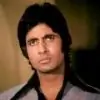Greetings everyone. I've been a bit busy with work and other comittments, which is why I am not posting as often as I did few months ago. I am gonna write one article, since I haven't written anything in a while. This time, it's about a playback legend.
Who hasn't heard of Mukesh Chand Mathur, who is known as Mukesh by everyone known him. He was born in July of 1923. When he turned sixteen years old, he attended his sister's barati and sang there. Actor Motilal was present and was amazed by his voice. Around 1940, Motilal took Mukesh to Bombay, took care of him and trained him. In 1941, he sang his first song and acted in the film "Nirdosh." That film didn't take off too well. It wasn't until 1945 when the big break that he was looking for came through.
In 1945, Anil Biswas offered him a composition for the film "Pehli Nazar." The song was "Dil Jalta Hai To Jalne De" pictured on Motilal. That song became well recognized and Mukesh started his playback singing career. Dil Jalta Hai was very well sung and he imitated his idol, K.L. Saigal, so well that Saigal said, upon hearing this song, that he didn't remember singing this song.
In Mukeshji's lifetime, 1948 was a significant year for him. He met with actor and aspiring film maker, Raj Kapoor. Raj Kapoor was very impressed with his voice that he wanted to use him in his first home-production "Aag." The song which became popular in that film was "zinda hoon iss tarah hoon gamein" by music director Ram Ganguly. In 1948, Naushad Ali became the first person to break the Saigal singing style in his voice. He had Mukesh sing in the film "Mela" in 1948 and "Andaaz" in 1949. The songs in both films became very popular and his voice became very well liked. His playback singing career started off with a perfect bang. Besides his career, his family life was starting to blossom. He married Saral in 1946, had his first daughter Rita in 1948, and his first son in 1950, who we all know as Nitin Mukesh Mathur.
In 1952, Mukesh realized his dreams and he felt he wanted to be an actor, instead of singer. He acted in a small handful of film such as Mashooqa in 1953, cameo in Aah in 1953 and his complete home production of Anuraag in 1956. He sang, music directed, produced, and directed the film. That film was an utter flop which left him in a state of trouble finanacially. He was not able to pay fees fo his children to attend school.
He realized that he would be much more successful as a singer. He tried to come back to singing for films only to find it all taken. Except for few songs in Shri 420, Manna Dey was "established" as the new voice of Raj Kapoor. Mohammed Rafi and Kishore Kumar were at their high points. Talat Mehmood and Hemant Kumar were used a good amount of times during this time. As a result, he didn't record much toward the latter 1950s. In 1958, Salil Chaudhary found Mukesh useful in singing for Dilip Kumar in Yahudi and Madhumati. In 1959, he won his first filmfare award for his song "sab kuch seekha humne" for Anari. His career's wheels started turning once again.
From 1959, Mukesh was Raj Kapoor's popular voice again, although Manna Dey would be there on occasion. In 1960, Mukesh's "rediscovery" took place when new composers Kalyanji Anandji came to the indsutry. With songs like "Mujhko iss raat ki tanhai mein" and the songs of Chalia "mere tute huye dil se" and "dam dam diga diga" set KA and Mukesh forward. As a result, KA got better assignments and with those assignments, Mukesh was there. The irony of their success story is that films that KA did with Mukesh turned to be flops, but the music became a super success. Films like Phool Baney Angarey (1963), Dulha Dulhan (1964), Ji Chahta Hai (1964), Saheli (1965), Dil Ne Pukara (1967), and Abroo (1968) were all flopped films which are rare to find these days. But their songs "Chand Aahein Bharega", "Humne tujhko pyaar kiya hai", "hum chod chale hai", "jis dil mein basa tha pyaar tera", "waqt karta jo wafa", and "jinhe hum bhool na chahe" were all remembered hits, respectively! KA's assistants, Laxmikant and Pyarelal, became independent music directors and found their success through the perfect films for Mukesh. Milan and Patthar Ke Sanam in 1967 helped Mukesh and LP during this time.
Around this time, we hit the 1970s were music slowly changes. Around this time, Rajesh Khanna, R.D. Burman's westernized fast paced music, and Kishore Kumar were the most desired persons and music. Mukesh's bass and soft vocals were not used as often during the 1970s. His voice got much thicker than the previous decade of the 60s. His thick voice was experimented with Jeetendra in Suhag Raat, Vishwas, and Mere Humsafar. Rajesh Khanna had Mukesh as his voice through Anand and Kati Patang. Feroz Khan was experiemnted succesfully in Safar, Upasana, Anjaan Rahein, Dharmatma, and Kabeela. He became the more recognized voice of Manoj Kumar from the late 60s till the mid 70s, although Mahendra Kapoor shared this title.
Still, he wasn't getting as many songs as other male playback singers, but he was churning hits anytime he sang. It wasn't until 1976 that he made another rediscovery. This was to be the most unsual combination, Yash Chopra film with Khaiyyam and the raga Yaman filmed on Amitabh Bacchan, the angry and rough man of the industry. Kabhie Kabhie was the name of this film. When Mukesh had a heart attack in early 1976, Khaiyyam wanted to give the title song of Kabhi Kabhie to someone else. When Mukesh saw Yash Chopra and Khaiyyam during his recovery, he requested that Kabhi Kabhie's title song would not be given to anyone else but him, as Mukesh really enjoyed the composition. It was the best composition of that year which beautifully fit in with Amitabh's persona.
When other music directors who hardly used him, such as R.D. Burman, or avoided experimenting his voice in different genres, heard Kabhi Kabhie, they decided to use his voice. This was his final rediscovery. But his final rediscovery had him sing for Amitabh again in the film Adalat, in which one song had Amitabh and Mukesh together. R.D. Burman found perfect use for Mukesh for six songs, which were slightly beyond his "usual genre" in 1976. LP used Mukesh in multi-starrer songs like in Imaan Dharam, Aahuti, Dharam Veer, and even had Mukesh sing for Vinod Khanna and say three lines for Amitabh in the unreleased version of Pardah Hai Pardah for Amar Akbar Anthony.
In 1976, Mukesh recorded his final song "Chanchal Sheetal Nirmal Komal" for Raj Kapoor's film Satyam Shivam Sundaram. Mukesh went to the US for his tour. Mukesh delayed his operation in order to finish the tour. In Detroit, August 26, 1976, Mukesh saw his son, Nitin Mukesh performing live with Lataji and felt that it was time for Nitin to take the footsteps. The next day, Mukesh passed away in a land alien to his motherland. Lataji took his body to India and his funeral ceremony was taped live as his last concert recording was played. His final concert is available on CD.
After his death, his songs still became hits. In November 1976, he won the Filmfare award for Kabhi Kabhie. In 1977, he was nominated for Filmfare for "Suhani Chandni Raatein", and in 1978, he was nominated for "Chanchal Sheetal Nirmal Komal." His voice is still remembered by all music fans, as they can relate to his romantic, sad, and funny songs,to name a few genres, sung by Mukesh.
His post-death releases:
1977: Dharam Veer, Amar Akbar Anthony, Mukti, Imaan Dharam, Farista Ya Qatil, Jaaneman, Chandi Sona
1978: Satyam Shivam Sundaram (this film dedicated to Mukesh's memory) was dedicated , Aahuti, Paramatma, Tumhari Kasam, Naukri
1979: Bombay By Nite, Meri Dosti Tera Pyaar
1980: Patthar Se Takkar, Shaitan Mujarim
1981: Saanjh Ki Bela, Farz Aur Pyaar, Maila Aanchal
1982: Aarohi
1983: Chor Mandali (last film where Mukesh song was picturized on Raj Kapoor)
1986: Love and God
1989: Shubh Chintak
1997: Chand Grahan (his final release)



























